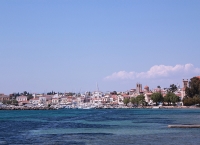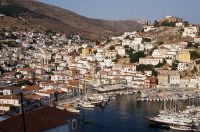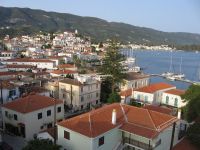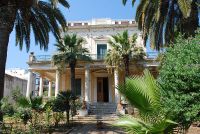Saronic Gulf Islands Travel Guide
Located a stone's throw away from Athens and the Peloponnese Peninsula, the Saronic Gulf Islands are much-loved weekend destinations among Greeks. Crowded to the point of madness in the peak summer season, they're also popular getaways for tourists holidaying on the mainland. Aegina, Poros, Hydra and Spetses are the most popular options, though lesser-known islands such as Agistri, Salamis, Patroklou, Vleves and Dokos have their own charms. On top of that, they're often less crowded. Daily cruises from Athens' Piraeus Port shuttle tourists back and forth, making trips to the Saronic Gulf Islands incredibly easy and reasonable for budget travellers. The islands are arguably at their best in early autumn and late spring, when the heat is milder, and crowds are less overwhelming.
Things to do in Saronic Gulf Islands
For Greeks and international tourists, the Saronic Gulf Islands are popular getaways from Athens, and each one has its own flavour. Aegina is the closest to Athens and, given its proximity to the capital, has become a holidaymaker's suburb of the city. Graced with lovely beaches, the busy, cosmopolitan island also has a rich and fascinating history. Visitors can enjoy attractions such as the Temple of Aphaia and the monastery at Agios Nektarios.
Hydra is considered the most beautiful of the Saronic Islands, with its quaint, picturesque main port accenting its gorgeous shores. Its booming tourist industry has not diminished its charm and character. Poros is known for its wooded, mountainous scenery and jolly nightlife. Apart from the exciting nighttime revelry in the waterfront area, its attractions include Bourtzi Castle, an Archaeological Museum, and the Sanctuary of Poseidon. Poros also has some great beaches.
Somewhat less crowded than islands such as Aegina, Spetses is extremely popular with luxury travellers, and has wonderful hiking and swimming locations. The endearingly picturesque port of Dapia has an old-fashioned charm. Agistri is very lovely, as well, and has a relaxed atmosphere. Its nightlife is nothing special within the Saronic Islands, but it's a wonderful destination for families.

Aegina
Aegina is the closest Saronic Gulf Island to Athens. As such, it's almost one of the city's suburbs, offering cosmopolitan shops, restaurants and accommodation. Formed largely from an extinct volcano, the island was once the training place of Achilles' elite fighting unit, the Myrmidons. Today, it boasts a buffet of cultural attractions. The well-preserved Temple of Aphaia and the monastery at Agios Nektarios are time-honoured favourites. Visitors can also enjoy the pretty town of Perdika, though it's likely to be busy during peak season. By ferry, the rugged island is around 40 minutes away from Piraeus port, and is a wonderful setting for seaside holidays.

Hydra
Considered the most beautiful island in the Saronic Gulf, Hydra has a number of pretty towns with not a high-rise building or noisy car in sight thanks to zealous development restrictions. The island is not named for the mythical beast, the Hydra, but comes from the Greek word for water and pays tribute to the natural springs on the island. Hydra port is the main village and the pretty, crescent-shaped harbour has some great restaurants, shops and galleries to entertain visitors. Steep and quaint stone streets lead upwards from the port, pebbled beaches ring Hydra's impressive mansions of wealthy Athenians, and there are worthwhile cultural attractions such as the Cathedral of Hydra and the Hydra Museum. Other villages and hamlets on the island include Mandraki, Kamini, Vlychos, Palamidas, Episkopi and Molos but as no cars are allowed the only methods of transport are donkeys, bicycles and your own two feet. This adds to the charm of the place and it is wonderful to walk or ride around the island. Though the island is very beautiful, its longstanding reputation as a weekend getaway spot has obliterated most traditional ways of life in favour of catering to tourists.

Poros
The ancient name of Poros was Pogon and it is actually an island-pair inclusive of Sphairia, the southern, volcanic island where the modern city is located, and Kalaureia, the larger, northern island. A bridge connects the two islands. Poros, separated from the Peloponnase by only a few hundred metres, is a quiet, wooded island with scenic pine, olive and lemon groves and a pretty monastery, as well as two good beaches at Askeli and Neorio. It is lush and mountainous and a popular weekend getaway for locals and tourists. Graves on Poros have been dated to the Mycenaean period and evidence suggests that the island-pair have been inhabited since the Bronze Age. The Archaeological Museum is worth a visit and houses findings from the Sanctuary of Poseidon and other nearby ancient sites. The city's main landmark is the clock tower built in 1927 and other attractions include Bourtzi Castle, built around 1828, and the original site of the Sanctuary of Poseidon which dates to roughly 520 BC. The presence of a naval training base means that Poros Town's waterfront area is often lively and crowded at night. However, many visit Poros simply to relax and enjoy the lovely scenery and beaches.

Spetses
Spetses is a popular weekend destination in the Saronic Gulf, with towns full of white-washed mansions and fragrant pine forests. Catering more for wealthy travellers than package tourists, the island's gently rolling hills are good for hiking, and intrepid explorers will find good swimming holes and beaches. The island's little port of Dapia, the first impression visitors get of Spetses, is surrounded by whitewashed, Neoclassical houses and ringed by smart cafés and stylish boutiques. The highlight of the season in Spetses is the celebration of the Panaghia Armata, which re-enacts an 1822 naval battle between the Greek forces and the Turkish Armada. Although the island is now as peaceful as they come, cannons still line the promenade as testament to its proud militaristic past. Part of Spetses's appeal is that the island remains comparatively undiscovered and travellers still get the feeling of being somewhere authentic, instead of touristy. Cars are banned from the central town area so locals still use horse-drawn carriages and bicycles to get around which adds to the charm. Spetses is quite a pricey island, thanks to the upper-class Athenians who retreat here for holidays, but it is a very rewarding one.
Greece travel info
Electricity
Electrical current is 230 volts and 50Hz. A variety of plugs are in use, including the European-style two-pin and the round three-pin.
Language
Greek is the national language, but English is widely spoken.
Money
The official currency is the euro (EUR), which is divided into 100 cents. All major credit cards are accepted and ATMs are widespread.
Tipping
A service charge is automatically added to most restaurant bills and an additional tip is not expected, though it's always welcome. Rounding up the bill is sufficient for drinks at cafes; taxis, porters and cloakroom attendants will expect a tip.
Health
There are no specific health risks but everyone 12 years of age and older should get fully vaccinated for COVID-19 before visiting Greece. Most health problems come from too much sun and too much food or alcohol, though there's also the risk of encountering sea urchins, jellyfish and mosquitoes. Medical facilities in major cities are excellent but some of the smaller islands are a long way from a decent hospital. Larger towns and resorts have English-speaking private doctors and the highly professional local pharmacies can usually deal with any minor complaint. Travellers should take along any necessary prescription medication. Food and water are safe, but those visiting for short periods should consider sticking to bottled water. After Brexit, the Global Health Insurance Card (GHIC) replaced the European Health Insurance Card (EHIC) for UK citizens. The GHIC allows UK citizens access to state healthcare during visits to the EU. The GHIC is not valid in Norway, Iceland, Liechtenstein or Switzerland, nor is it an alternative to travel insurance.
Safety
Though Greece is a safe destination, peak tourist season usually sees a spike in petty theft cases, especially in crowded areas. Visitors should conceal valuables or store them in hotel safes and watch out for pickpockets. Violent crime is rare but there have been incidents on some islands; visitors travelling alone should not accept lifts from strangers.
Local customs
Though more traditional than the British in some ways, most Greeks are friendly and welcoming enough to seem intrusive to reserved British tourists. Greeks are also the heaviest smokers in Europe and will often ignore the smoking ban in public places. Swimwear is expected on the beach but tourists should dress properly in bars and restaurants.
Doing business
Greeks prefer to dress formally in dark-coloured suits for men and stylish outfits for women. Punctuality is important to them though meetings may not start immediately. Visitors should offer a firm handshake and maintain eye contact when greeting Greek men and women for the first time, and print business cards in both Greek and English. There is no ritual surrounding the exchange of business cards.
As Greeks like getting to know their colleagues before conducting any serious business, it's unlikely a deal will take shape at the first meeting. The local culture follows a hierarchical structure and visitors should show respect in the same way. Gift giving is common in social settings but not necessarily in business.
Duty free
Travellers visiting from inside the EU can bring in 800 cigarettes, or 200 cigars, or 400 cigarillos, or 1kg of tobacco, 10 litres of spirits with an alcohol volume over 22 percent, 20 litres of spirits with an alcohol volume under 22 percent, 90 litres of wine and 110 litres of beer.
Visitors arriving from outside the EU and are over the age of 17 will not pay duty for 200 cigarettes, or 50 cigars, or 100 cigarillos, or 250g of tobacco, 1 litres of spirits with an alcohol volume over 22 percent, 2 litres of spirits with an alcohol volume under 22 percent, 4 litres of wine and 16 litres of beer.
Communications
The international access code for Greece is +30 and the outgoing code is 00, followed by the relevant country code (e.g. 0044 for the United Kingdom). Free WiFi is available at cafes, hotels, restaurants and similar establishments throughout Greece; purchasing a local prepaid SIM card can be a cheaper option to paying high international roaming costs.
Passport & Visa
The borderless region known as the Schengen Area includes the following countries: Austria, Belgium, Czech Republic, Denmark, Estonia, Finland, France, Germany, Greece, Hungary, Iceland, Italy, Latvia, Lithuania, Luxembourg, Malta, The Netherlands, Norway, Poland, Portugal, Slovakia, Slovenia, Spain, Sweden, and Switzerland. All of these countries issue a standard Schengen visa that has a multiple entry option, and which allows the holder to travel freely within the borders of all the aforementioned countries.
Non-EEA travellers to Greece must hold visible means of financial support to cover their stay in the country. It is also recommended that non-EEA members hold return or onward tickets, and the necessary travel documentation for their next destination. Passengers not holding onward tickets may be asked for proof of sufficient funds for their return or onward journey. It is highly recommended that travellers' passports have at least six months' validity remaining after the intended date of departure from their travel destination. Immigration officials often apply different rules to those stated by travel agents and official sources.
Entry requirements
US citizens must have a passport that is valid three months beyond the period of intended stay. No visa is required for a touristic stay of up to 90 days within a 180 day period.
British passports endorsed 'British Citizen', 'British Subject' (containing a Certificate of Entitlement to the Right of Abode issued by the United Kingdom), and 'British Overseas Territories Citizen' issued by Gibraltar, only need to be valid for period of intended stay in Greece. All other endorsements require at least three months validity beyond the period of intended stay in Greece.
A visa is not required for passports endorsed 'British Citizen', 'British Subject' (containing a Certificate of Entitlement to the Right of Abode issued by the United Kingdom), and 'British Overseas Territories Citizen' issued by Gibraltar. No visa is required for stays of up to 90 days in a 180 day period for holders of passports with any other endorsement.
Holders of identity cards issued by Gibraltar authorities, and endorsed 'Validated for EU travel purposes under the authority of the United Kingdom', do not require a visa to visit Greece.
Canadian citizens must have a passport that is valid for at least three months beyond the period of intended stay in Greece. No visa is required for a touristic stay of up to 90 days within a 180 day period.
Australian citizens must have a passport that is valid for at least three months beyond the period of intended stay in Greece. No visa is required for a touristic stay of up to 90 days within a 180 day period.
South African citizens must have a passport that is valid for at least three months beyond the period of intended stay, and a valid Schengen visa, to enter Greece.
Irish citizens must have a passport that is valid on arrival in Greece. No visa is required.
New Zealand citizens must have a passport that is valid for at least three months beyond the period of intended stay in Greece. No visa is required for a touristic stay of up to 90 days within a 180 day period.
Useful contacts
Greek National Tourism Organisation, Athens: +30 21 870 7000.
112 (general European emergency number); 1571 (tourist police)Embassies / consulates in other countries
Greek Embassy, Washington DC, United States: +1 202 939 1300.
Greek Embassy, London, United Kingdom: +44 20 7313 5600.
Greek Embassy, Ottawa, Canada: +1 613 238 6271.
Greek Embassy, Canberra, Australia: +61 2 6271 0100.
Greek Embassy, Pretoria, South Africa: +27 12 348 2352.
Greek Embassy, Dublin, Ireland: +353 1 676 7254.
Greek Embassy, Wellington, New Zealand: +64 4 473 7775.
Embassies / consulates in Greece
United States Embassy, Athens: +30 21 721 2951.
British Embassy, Athens: +30 21 727 2600.
Canadian Embassy, Athens: +30 21 727 3400.
Australian Embassy, Athens: +30 21 870 4000.
South African Embassy, Athens: +30 21 617 8020.
Irish Embassy, Athens: +30 21 723 2771.
New Zealand Consulate-General, Athens: +30 21 692 4136.



